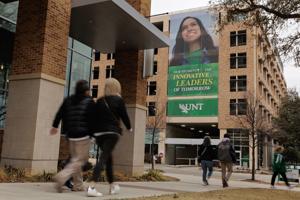University of North Texas administrators recently told faculty and staff members that university leaders were working to soften the blow of rising costs and dipping enrollment. In an email obtained by the Denton Record-Chronicle, UNT leaders said they have been fielding concerns from employees about the university’s financial outlook. The email was signed by UNT President Harrison Keller and Vice President of Finance and Administration Clayton Gibson.
“It is true we are facing challenging decisions ahead,” the email said. “The impacts of inflation — rising costs for food, insurance, equipment, and utilities — being felt by you and your families are also impacting UNT. And for the first time in several years, UNT is experiencing a decrease in enrollment.

” Funding decisions won’t be final until later this summer, the email said. That’s when UNT leaders expect more certainty on state appropriation and enrollment, which Keller and Gibson called “the two major drivers of our university budget.” “As we await information, we are taking proactive and responsible steps to mitigate impact and focus on cost-saving measures, emphasizing financial transparency, supporting student retention, and advocating for continued investment in our university,” the administrators said in the email.
Devynn Case, the director of UNT media relations, said in an email that the drop in enrollment was slight but that administrators are watching it closely. “UNT continues to monitor actions at the state and federal level,” Case said. “UNT saw a decrease in overall enrollment of about 1 percent in Fall 2024.
While we are monitoring closely and planning for a conservative budget, it is too early to speculate on campus enrollment for Fall 2025. When President Keller joined UNT last August, he emphasized the importance of strategic budgeting to ensure we are aligning the university’s resources with its mission and priorities.” The potential funding crunch wasn’t unexpected, and the financial forecast is more complicated than it seems.
After Keller was installed as the new president last fall, he attended faculty senate meetings where he laid out his plan to review UNT’s financial profile and make changes to the budgeting process. One of his aims was to make university operations more efficient and more transparent. At his installation ceremony, Keller said college tuition is too costly for students to take on debt but not get their degrees.
He established a University Budget Council shortly after he started his tenure at UNT. On the university’s strategic budgeting webpage , the administration said growth in sponsored research — which comes from government agencies and third parties — and growth in enrollment between 2021 and 2023 demands changes in money management. “The need for the kinds of opportunities and contributions UNT can provide continue to expand rapidly across our region, our state, and beyond,” the budgeting statement said.
“The approach to budgeting that had been used historically at UNT was a combination of incremental and centralized budgeting.” In a strategic budgeting update posted last December, budgeting steering committee chair Albert Bimper, who is dean of the UNT College of Liberal Arts and Social Sciences, said a draft model for a new budget process would depart from the historical model to a process that is “incentive-based.” “This new strategic budget model will emphasize a transparent process that provides a direct line of sight from revenue generation to the support of our collective university priorities,” Bimper said in the update.
Officials expect to implement the new model so that it launches in spring of fiscal year 2026. Even as the 2024-25 school year started with focus on a new budget process, economic uncertainty has only grown since January. Not all of the news is bad, though.
During the April faculty senate meeting, Gibson said the university was dealing with “tailwinds” and “headwinds.” The tailwinds have come in the form of an increase — between an additional $28 million and $51 million in Higher Education Fund disbursement. “Our current HEF is $38 million dollars,” Gibson told faculty senators.
“The initial proposal that we saw for the entire state means that we would go up $28 million. It’s a pretty meaningful increase because that means there are more renovations [that can get done]. ” A bill filed earlier this month could increase the disbursement by $51 million.
“So it’s amazing,” he said. “I wish I had that in operations versus restricted to buildings. But again, you know, take it where you can get it.
” UNT could also see more funding from the Texas University Fund, a $3.9 billion endowment established by the state Legislature and voters in 2023. If the university hits the research spending threshold this year, which would be more than $50 million, it could draw interest money from the state’s one-time placement of $650 million in trust.
“I believe we get 650 million dollars, and it goes in what we call a trust fund.,” Gibson said. “The state keeps the money, the State Controller, they invest it in the stock market to get the interest.
But from the amount we received this year, so far, it was $29 billion. “So it’s pretty meaningful.” The final tailwind Gibson mentioned is brisk undergraduate enrollment.
But graduate program enrollment among international students has dropped. “It was lower than we expected this fall, and it was lower than we expected this spring, and time will tell where it lands in the fall,” Gibson said. Then came the “headwinds,” which Gibson said are federal uncertainty, state appropriations still in committee, and a decline especially in international graduate student enrollment.
International graduate students are important to the university not only because some participate competitively in research, but because their enrollment is paid in cash. “If you’re hearing [program] chairs, saying, ‘Hey, my program had 300. Now, I have a 150.
That’s not just a statement. It’s a very specific amount of revenue and cash that we can calculate based on each each person that doesn’t return.” Prospective students from Iran, China, North Korea and Russia could have been spooked when the state Legislature filed House Bill 17, which would determine where they can rent property.
Exemptions for renters were proposed, and the bill is pending in committee. A source at the university who asked not to be named said faculty and staff are worried about layoffs, which could come in the form of adjunct faculty contracts ending. With fewer adjunct professors, tenured professors might be expected to take on additional courses.
More time in the classroom means fewer hours for academic research, the source said. Softening research isn’t favorable to UNT’s status as a Tier 1 Carnegie research Institution..
Health

Rising costs, falling enrollment have UNT facing possible funding squeeze

University of North Texas administrators recently told faculty and staff members that university leaders were working to soften the blow of rising costs and dipping enrollment.















